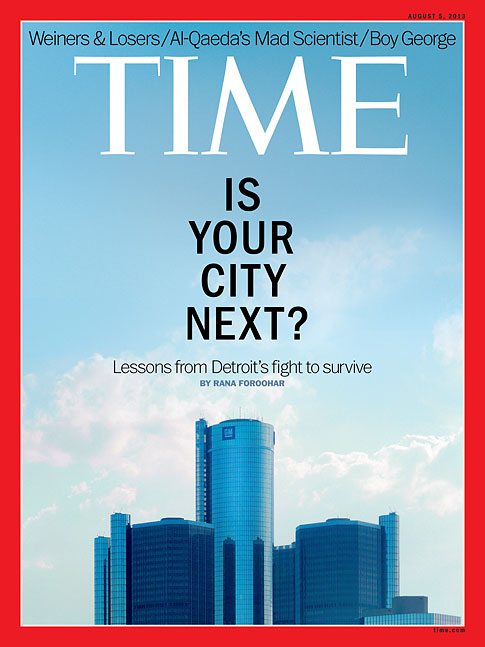
The lights have gone out in Detroit, literally. Forty percent of the streetlights don't work, since there isn't enough money to keep them on, or up, in a city that some 60 years ago was the richest in the country and perhaps the world. But that was another time, when the city's manufacturing might powered the Arsenal of Democracy and its factories turned out the cars that shaped the map of modern America.
Now, Detroit has acquired bragging rights that make it the envy of no one. By declaring bankruptcy on July 18, it became the largest-ever municipal failure in the U.S. Creditors including big-name investors and pension funds are already knocking at the door, waiting to see who will get paid first, or at all. Public workers are bracing for pension cuts that may leave their retirement plans in ruins. Residents can look for taxes to go up even as services continue to decline.
Detroit's pain is unavoidable if the city is to save itself but it may ultimately help save other cities too. That's because America's cities desperately need a wake-up call to fix their finances. Though nearly everyone agrees that Detroit is in particularly bad shape, many of its underlying issues crushing debt and unfunded and unsustainable retiree benefits are not unique. And those legacy costs are at the heart of what many experts believe is a coming municipal-finance crisis in the U.S.
The good news is that city finances are not the same thing as city economies. In much of the country, unemployment is ticking down, tax receipts are up, and the property market, a huge generator of local income, is starting to recover. Detroit is going bankrupt at a time when it actually has a viable plan for growth. Likewise Chicago, which was recently downgraded, is at the forefront of some of the country's most innovative experiments in educational reform, private-public partnerships and alternative-energy investment. Meanwhile, other cities are thinking and working outside the box, from Providence, R.I. (crafting compromises with public employees to reduce long-term liabilities), to Miami (funding infrastructure projects with private consortiums instead of public debt).
It may not be much consolation to the people of Detroit or the other cities that must get their finances in order. Battles are already under way to decide if bankruptcy will let Detroit escape its pension commitments and turn away creditors. Promises, it must be said, will be broken; the questions now are which ones and how badly.

